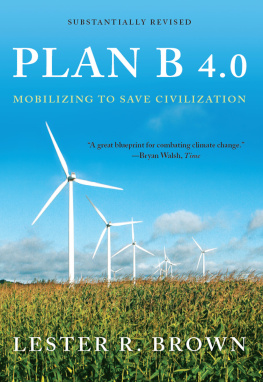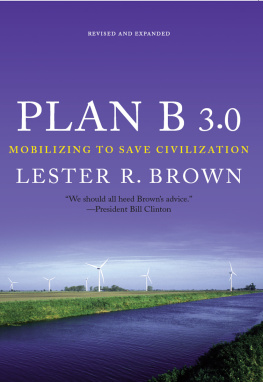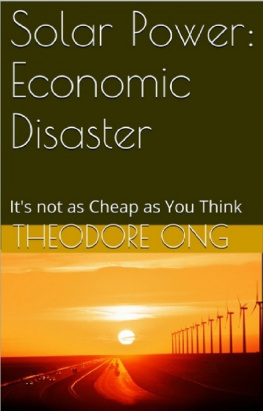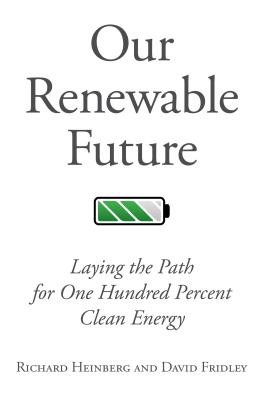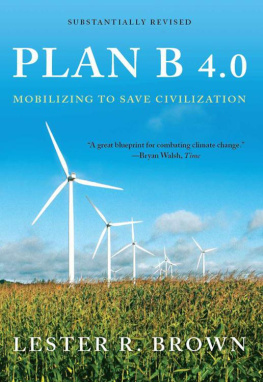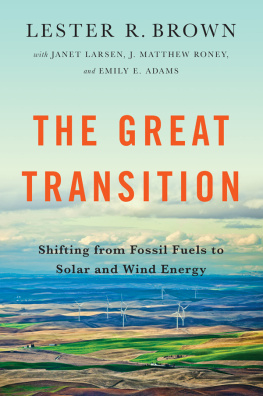Praise for Plan B
Lester Brown tells us how to build a more just world and save the planetin a practical, straightforward way. We should all heed his advice.
President Bill Clinton
a far-reaching thinker.
U.S. News & World Report
Its excitinga masterpiece!
Ted Turner
[Browns] ability to make a complicated subject accessible to the general reader is remarkable
Katherine Salant, Washington Post
If the 2007 Nobel Peace Prize had been extended to a third recipient, the logical candidate would have been Lester Brown.
Edward O. Wilson
Brown is impassioned and convincing when talking about the worlds ills and what he considers the four great goals to restoring civilizations equilibrium
April Streeter, TreeHugger.com
In this impressively researched manifesto for change, Brown bluntly sets out the challenges and offers an achievable road map for solving the climate change crisis.
The Guardian
In tackling a host of pressing issues in a single book, Plan B 2.0 makes for an eye-opening read.
Times Higher Education Supplement
The best big-picture summary of our environmental situationboth the problems and the solutionsIve ever read.
Grist
A great book which should wake up humankind!
Klaus Schwab, World Economic Forum
Lester R. Brown, one of the worlds preeminent eco-economistshas a solution for dealing with the threatPlans must be periodically revised and refined, which Brown has done with insight and foresight in this volume.
Ode
a highly readable and authoritative account of the problems we face from global warming to shrinking water resources, fisheries, forests, etc. The picture is very frightening. But the book also provides a way forward.
Clare Short, British Member of Parliament
Lester R. Brown gives concise, but very informative, summaries of what he regards as the key issues facing civilization as a consequence of the stress we put on our environment.a valuable contribution to the ongoing debate.
The Ecologist
An enormous achievementa comprehensive guide to whats going wrong with earths life support system and how to fix it.
Grinning Planet
Plan B has three parts: restructuring the global economy, working to eradicate poverty and reversing environmental destruction. Tall orders, to be sure: but Plan B is here thoughtfully laid out to achieve the seeming impossibleand with an understanding of world trends and cultures too.
The Midwest Book Review
Lester R. Brownoffers an attractive 21st-century alternative to the unacceptable business-as-usual path that we have been following with regard to the environment (Plan A), which is leading us to economic decline and collapse.
Thomas F. Malone, American Scientist
Browns overall action plan is both comprehensive and compelling.
Caroline Lucas, Resurgence
A great book about ways to improve the environment and sustain economic progress.
St. Petersburg Times
Plan B 3.0 is a great wealth of information on the environment unequaled in any other source of which I am aware.
Walter Youngquist, author of GeoDestinies
Beautifully written and unimpeachably well-informed.
Ross Gelbspan, author of The Heat Is On
The best single volume on saving the earth, period.
Geoffrey Holland, author of The Hydrogen Age
P LAN B 4.0
O THER N ORTON B OOKS
BY L ESTER R. B ROWN
Plan B 3.0: Mobilizing to Save Civilization
Plan B 2.0: Rescuing a Planet Under Stress and a Civilization in Trouble
Outgrowing the Earth: The Food Security Challenge in an Age of Falling Water Tables and Rising Temperatures
Plan B: Rescuing a Planet Under Stress and a Civilization in Trouble
The Earth Policy Reader with Janet Larsen and Bernie Fischlowitz-Roberts
Eco-Economy: Building an Economy for the Earth
State of the World 1984 through 2001 annual, with others
Vital Signs 1992 through 2001 annual, with others
Beyond Malthus with Gary Gardner and Brian Halweil
The World Watch Reader 1998 editor with Ed Ayres
Tough Choices
Who Will Feed China?
Full House with Hal Kane
Saving the Planet with Christopher Flavin and Sandra Postel
Building a Sustainable Society
Running on Empty with Colin Norman and Christopher Flavin
The Twenty-Ninth Day
In the Human Interest
Earth Policy Institute is a nonprofit environmental research organization providing a plan for building a sustainable future. In addition to the Plan B series, the Institute issues four-page Plan B Updates that assess progress in implementing Plan B. All of these plus additional data and graphs can be downloaded at no charge from the EPI Web site.
Web site: www.earthpolicy.org
P LAN B 4.0
Mobilizing to Save Civilization
Lester R. Brown
EARTH POLICY INSTITUTE
W W NORTON & COMPANY
NEW YORK LONDON
Copyright 2009 by Earth Policy Institute
All rights reserved
The E ARTH P OLICY I NSTITUTE trademark is registered in the U.S. Patent and Trademark Office.
The views expressed are those of the author and do not necessarily represent those of the Earth Policy Institute; of its directors, officers, or staff; or of any funders.
ISBN: 978-0-393-07809-1
W. W. Norton & Company, Inc., 500 Fifth Avenue,
New York, N.Y. 10110
www.wwnorton.com
W. W. Norton & Company, Ltd., Castle House, 75/76 Wells Street, London W1T 3QT
Preface
Several months ago I was reading an article in Newsweek on climate and energy when a line jumped off the page: Business as usual has started to read like the end of the world.
Although this conclusion may surprise many, it will not surprise the scientists who track global environmental trends such as deforestation, soil erosion, falling water tables, and rising temperature. For some time they have been saying that if these trends continue we will be in trouble. What was not clear was what form the trouble would take.
It looks now as though food is the weak link, just as it was for many earlier civilizations. We are entering a new food era, one marked by higher food prices, rapidly growing numbers of hungry people, and an intensifying competition for land and water resources that has now crossed national boundaries as food-importing countries try to buy or lease vast tracts of land in other countries.
Unlike earlier grain price hikes that were caused by singular eventsa drought in the Soviet Union or a monsoon failure in Indiaand were typically remedied by the next harvest, this recent rise is trend-driven. Among the trends responsible are population growth, falling water tables, rising temperature, ice melting, and the use of grain to produce fuel for cars.
In decades past, when grain prices climbed, the U.S. Department of Agriculture simply returned some cropland idled under farm programs to production, but now that land is all in use. Suddenly, food security has become a highly complex issue. Energy policy may affect future food security more than agricultural policy. Eradicating hunger may depend more on the success of family planners than that of farmers. Raising water productivity may contribute more to future food security than expanding the irrigation water supply would.
In his book The Collapse of Complex Societies , Joseph Tainter observes that civilizations become progressively more complex as they evolve until eventually they cannot manage the complexity. I was reminded of this as I watched Congress wrestling with the climate bill, whittling away at its goals as this book was going to press.
International institutions are also wrestling with complexity. At this writing, all eyes are on the upcoming Copenhagen climate conference in early December. From my vantage point, internationally negotiated climate agreements are fast becoming obsolete for two reasons. First, since no government wants to concede too much compared with other governments, the negotiated goals for cutting carbon emissions will almost certainly be minimalist, not remotely approaching the bold cuts that are needed.

